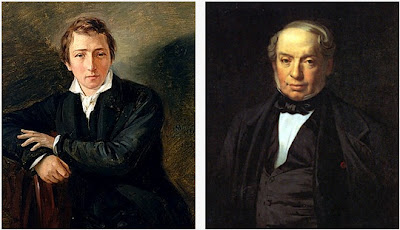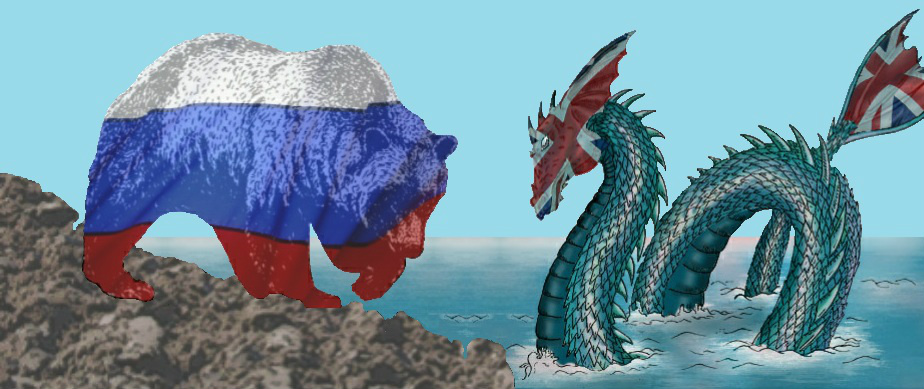"... the poet was the first to call
attention to the future of Socialism."
German-Jewish poet Heinrich Heine
(1797-1856) and his friend,
German-Jewish banker James (Jacob) de
Rothschild (1792-1868).
Both portraits are the work of Jewish
artist Moritz Oppenheim (1800-1882),
who was commissioned to paint
many portraits of the Rothschild family.
-
Heinrich Heine was a distant
relation and a very good friend of
Karl Marx (1818-1883), he once saved
the life of Marx's infant daughter
Jenny.
-
Heine was also friends with Karl
Marx's close relations, the
Rothschild banking dynasty.
-
An admirer of Heine's work was Jacob
Schiff (1847-1856), the
Frankfurt-born, Jewish banker, whose
grandfather had shared a
home (the so-called: House at the
Green Shield) with James de
Rothschild's father in
Frankfurt Judengasse (Jews' Alley).
-
A highly symbolic line from
a Heine poem was found written upon
a wall of the cellar in which the
Russian Czar and his family were
murdered in 1918. It's probable the
author had attended a lecture course
on Heine's work held in New York in
early 1914, which was financed by
Jacob Schiff.
Following is an anecdote (dating
from at least 1865) about Heine
dining with James de Rothschild, and
a quip the
former wrote (in 1841) of one of his
many visits to the latter:
"BARON JAMES ROTHSCHILD had,
like his brother Nathan, the
reputation of being a boor — or
brute, socially ; at any rate, when
he took a whim to be. He seemed,
when in this mood, to delight in
showing off his parvenu vulgarity,
and assumed the airs of a nabob with
every one for whom he did not
particularly care. ... Having
quizzed the poet Heine once rather
sharply, at dinner, the latter
betrayed his host into some remark
on the name of the wine they were
drinking — Lacrima Christi. 'Curious
name — I can't account for it,' said
the millionnaire. 'Oh !' replied the
wit, 'the etymology is very simple ;
Christ weeps that Jews should drink
such excellent wine!'"
"I (Heinrich Heine) like best to
visit him (James de Rothschild) at
the offices of his bank, where I can
observe as a philosopher how the
people, and not only God's people,
but also all others bow and scrape
before him. They do such a twisting
and turning of their spines as would
make the best of acrobats be hard
put to it. I saw people who shivered
when they approached the great Baron
as though they had touched a Voltaic
pile. At the very door of his office
many of them were seized by an awful
shuddering, such as Moses felt when
he stood on the holy ground of
Horeb. And just as Moses then took
off his shoes, so many a broker or
agent de change would take off his
boots before daring to enter the
private office of Herr von
Rothschild, if he were not afraid
that his feet would smell and so
incommode the Herr Baron. That
private office is, indeed, a
remarkable place which excites noble
thoughts and sentiments, like the
sight of the ocean or the starry
Heavens : we see in that office how
small is man, and how great is God !
For money is the God of our time,
and Rothschild is his prophet.
Several years ago, once when I
wanted to see Herr Rothschild, a
liveried servant carried his chamber
pot across the corridor, and a
speculator who happened to pass at
the same moment took of his hat
reverently to the might pot. So far,
I say it with all respect, goes the
respect of certain people. I made a
note of the name of that devout man,
and I am convinced that in time he
will be a millionaire."
"I do not know, but I think that at last
the head of the great water-snake
(England)
will be crushed, and the skin pulled
over the head of the bear of the North
(Russia)."
- Heinrich Heine, friend of the James de
Rothschild & Karl Marx on what Communism
will achieve
Karl Marx and Heinrich Heine
supposedly first meet in Paris in
December 1843. Marx had just turned
24 years-of-age, Heine was 45, a
famous poet and foreign
correspondent, whose articles
appeared frequently in the Prussian
and Bavarian press. A
year-and-a-half before their first
meeting, in June and July 1842
Heinrich Heine was predicting the
horrifying future of "communism" in
his regularly letters (published
anonymously) for the Bavarian
newspaper Augsburger
Zeitung.
Heine wrote June 20th, 1842:
(Prominent French politician) Guizot has
only one foe to fear — that foe is
the later Gnizot, the Guizot of
Communism, who has not as yet come
forth, but who certainly will come,
and be as unterrified and unselfish
as the Thought; for even as that
doctrinaire identified himself with
the system of the bourgeois
régime so
this one will unite with that of
agrarian rule, and consequence
oppose consequence. It will be a
terrible combat.
The fearful wheel would again begin
to turn, and we should see an
adversary appear who would be the
most alarming of all who have ever
entered the lists. This antagonist
as yet preserves his terrible
incognito, and lives as yet like a
poor pretender in that ground-floor
or cellar of official society, in
those catacombs where the new life
germinates and buds. Communism is
the name of the terrible antagonist
which sets agrarian rule in all its
consequences in opposition to the bourgeois
régime of to-day.
It will be a terrible conflict — how
will it end? That the
gods and goddesses only know who
know the future. This much do we
know, that Communism, though it be
at present but little discussed, and
now yearns away its life in
forgotten garrets on wretched
straw-pallets, is still the gloomy
hero to whom a great if transitory
part is assigned in the modern
tragedy, and which only waits its
cue (Stichwort réplique) to
enter on the stage. We should never
lose sight of this actor, and we
will from time to time give accounts
of the secret rehearsals in which he
is preparing for his débût.
Such indications are perhaps more
important than reports of electoral
intrigues, party quarrels, and
cabinet intrigues.
The
Works of Heinrich Heine Volume VIII.
Translated from the German by
Charles Godfrey Leland (Hans Breitmann).
London: William Heinemann. 1893. pp.297-302.
Heine wrote July 12th, 1842:
What would be the end of this
movement (Communism) for which Paris
has, as usual, given the signal? It
would be a war, the most terrible
war of destruction, which — more's
the pity ! — will call the noblest
races of civilisation into the
arena, to their joint destruction. I
mean Germany and France. England,
the great sea-serpent, which can
always glide back into its watery
nest, and Russia, which in its vast
forests of firs, steppes, and
ice-fields has also the securest
lairs — these two cannot be utterly
destroyed in a common political war,
even by the most decided defeats;
but Germany is, in such a case, in
far greater danger, and even France
may suffer terribly in her political
existence. But this would be, so to
speak, only the first act or
prologue to the grand drama. The
second will be the European or the
world Revolution, the gigantic
battle of the disinherited with the
inheritors of fortune, and in that
there will be no question of
nationality or of religion, for
there will be but one fatherland,
the Earth, and but one religion,
that of happiness in this life.
Will the religious doctrines of the
past in every country unite to a
desperate resistance, and thus form
a third act in the great play ? Or
will the old Absolute tradition
enter again on the stage, but this
time in a new costume and with new
watchwords to incite and goad? How
will this drama end? I do not know,
but I think that at last the head of
the great water-snake will be
crashed, and the skin pulled over
the head of the bear of the North.
And then perhaps there will be only
one flock and one shepherd — a free
shepherd with an iron crook — and
one great herd of men all shorn and
all bleating alike. Wild and gloomy
times come roaring on, and the
prophet who would write a new
Apocalypse must imagine new beasts,
and those so terrible that the old
symbols of St. John as compared to
them will seem like soft doves and
amorets. The gods hide their faces
out of pity to the sons of mankind,
their nurslings for so many years,
and perhaps out of fear as to their
own fate. The future has an odour as
of Russian leather, blood,
blasphemy, and much beating with the
knout. I advise our descendants to
come into the world with thick
skins.
Incidentally, the "great sea serpent",
supposedly a real leviathan,
was "seen
again" in 1848. Perhaps this was a cause
célèbre during
the mid-nineteenth century, and explains
Heine's reference.





































If you can read French, see this: http://www.scribd.com/doc/52138511/Salluste-Les-Origines-Secretes-Du-Bolchevisme-Henri-Heine-et-Karl-Marx-Revue-De-Paris-June-1-1928
Reply